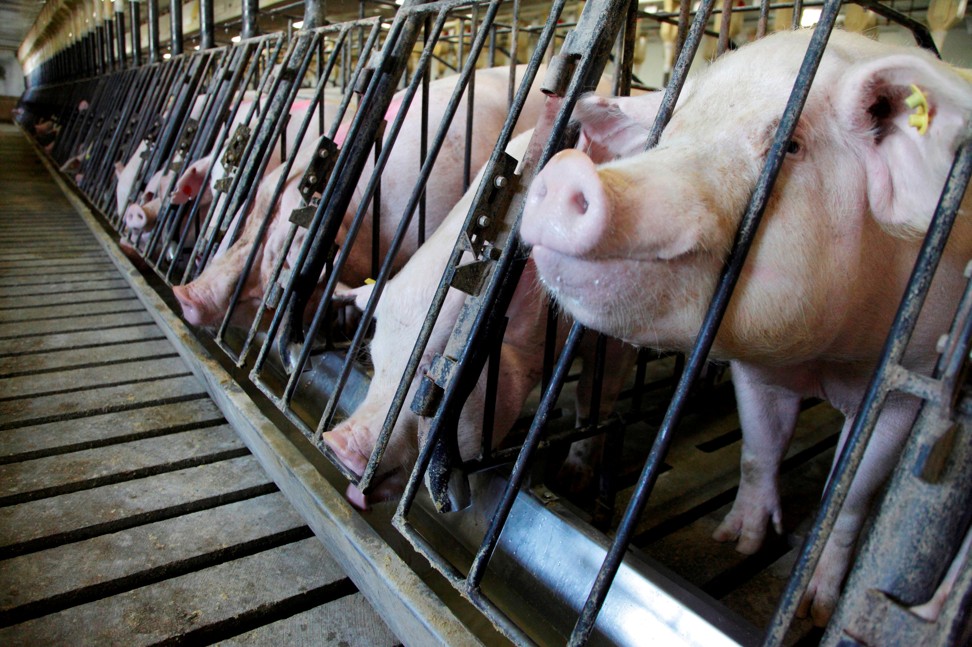
China will give as good as it gets in trade war with United States, ambassador says
Any tariffs imposed by Washington on Chinese goods will be met with countermeasures of equal weight, Cui Tiankai says
China will respond to any new US tariffs on Chinese products with countermeasures of the “same proportion” and intensity, Beijing’s ambassador to the US said on Tuesday, as the threat of a trade war between the world’s two largest economies continues to loom large.
Cui Tiankai said China would “certainly” take retaliatory measures against the US$50 billion to US$60 billion in tariffs expected to be announced by Friday, following the United States’ “Section 301” investigation into Beijing’s intellectual property practices.
His remarks came during an interview with state-owned China Central Television and after China’s commerce ministry on Monday imposed US$3 billion worth of tariffs on 128 US products, including fruit, wine and pork. That action was taken in response to the imposition of US tariffs on steel and aluminium resulting from a separate “Section 232” investigation.
“If they do [impose new tariffs] we will certainly take countermeasures of the same proportion and of the same scale, same intensity,” Cui said.
Former Chinese finance minister Lou Jiwei said last month that such retaliation might target US soybeans – its most valuable export to China, worth US$14 billion annually – as well as its cars and planes.
However, such a move could well be costly for Chinese businesses and consumers. Soybeans, for instance, are a vital part of the animal feed produced in China and any shortage in the supply from the US would likely drive up prices of equivalent goods from Brazil and Argentina.
Without US soybeans, China could be left with a shortfall of an estimated 10 million metric tonnes, according to Paul Burke, North Asia director for the US Soybean Export Council.
“It’s a negative for both US soybean farmers, and also for the Chinese government and Chinese consumers,” he said earlier in Beijing.
The tit-for-tat nature of the China-US dispute has sparked fears it will escalate into a full-scale trade war. While Beijing has consistently said a trade war would not be good for either side, US President Donald Trump has frequently complained about China’s “one-sided and unfair” US$275.85 billion trade surplus with the US, and in early March took to his favoured medium to tweet that “trade wars are good, and easy to win”.
The rising tensions helped send US stock markets tumbling on Monday, erasing memories of the record highs recorded in the first year of Trump’s presidency. The Dow Jones this year reported its first first-quarter decline since 2015, with stocks falling more than 4 per cent in the first three months of 2018.
The losses may dampen Republican momentum going into the midterm elections in November, particularly as Trump used earlier market gains as a benchmark for his presidential successes.
Analysts say China’s retaliatory trade measures, like the new tariffs on US pork products that will hurt pig farmers in Republican-friendly states, are strategically targeted at people who make up Trump’s rural political base.
“[It’s] no surprise they targeted red state products,” Adams Lee, an international trade lawyer at the US firm Harris Bricken, said.
The Trump administration’s incoming round of tariffs are expected to target Chinese technology products, including those benefiting from Beijing’s “Made in China 2025” – an innovation-driven development strategy intended to turn the country into a manufacturing powerhouse. But the measures might also crack down on Chinese investments in technologies, such as semiconductors and 5G wireless communications, Bloomberg reported, citing anonymous sources.
“Trump loves tariffs as his preferred trade weapon of choice,” Lee said. “But if Trump imposes other non-tariff measures [quotas, investment restrictions], that would open up the spectrum for possible counter actions. It could get messy fast.”
Cui on Monday also pushed back at allegations of China’s intellectual property “theft”, saying the country had made “good progress” in strengthening its technological protections and legal system.
“We are ready to look at specific cases if there’s any violation of intellectual property rights,” he said. “We are ready to deal with these issues in accordance with our own laws, and we are ready for international cooperation in this area … This is the shared responsibility of all governments.”


